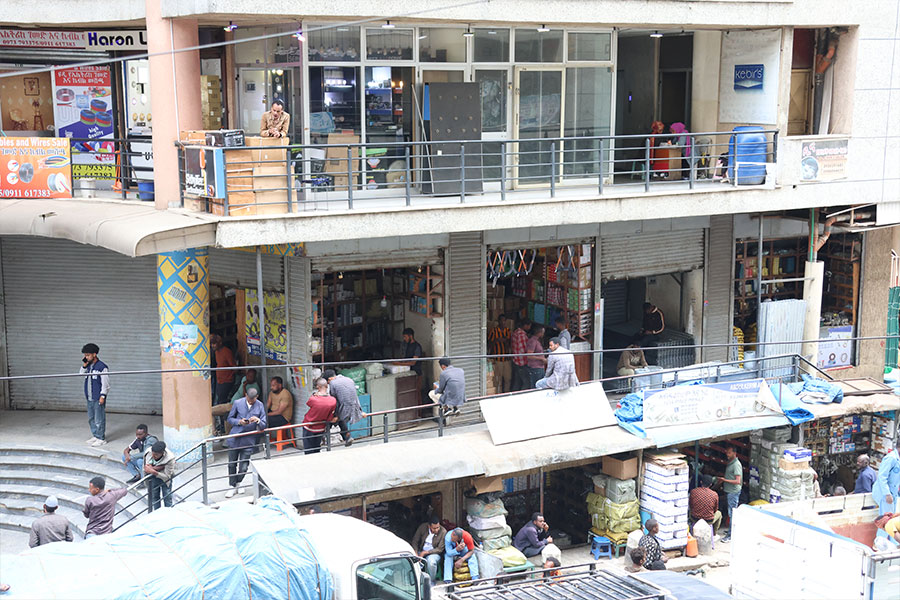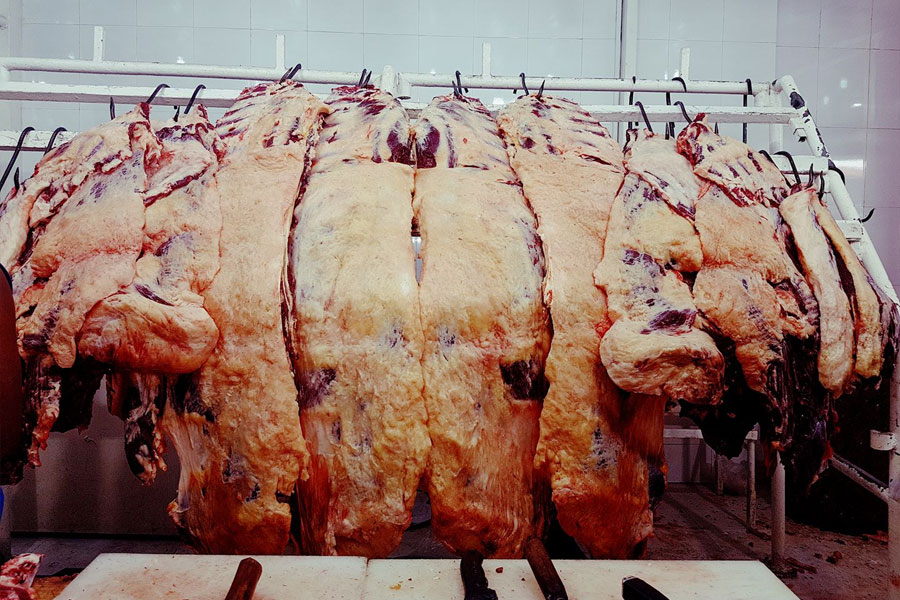
Radar | Dec 15,2024
Consumers and traders have congregated in designated areas of Addis Abeba for a Sunday market that many have come to depend on for affordability. Last Sunday, hundreds of shoppers, around a dozen cooperatives, and a handful of traders crowded the sidewalks of Ras Abebe Aregay Street near Mexico Square, one of five locations where the market goes on every week.
A resident of Lideta area, Meseret Adugna, 59, brought her young daughter along to shop for groceries. She waited for a vendor working with Beza Cooperative to weigh the five kilogrammes of potato she was buying. A look of satisfaction abounds her face; Meseret was getting a good deal. The potatoes were going for 10 Br a kilo, nearly half what she would have spent at one of the shops in her neighbourhood in the Lideta District.
In her right hand, she held a bag with packs of spaghetti, which cost 20pc less at the Sunday market than elsewhere in the city.
"It's delightful even to see all these commodities here," she said.
Organised by the Addis Abeba Trade Bureau, with the Addis Abeba Cooperative Agency, the Sunday market is dominated mainly by consumer cooperatives.
Beza is one of 23 cooperatives in the Kolfe Qeraniyo District overseen by a union. There are 148 cooperatives in the capital, each organised under a union. The 10 districts in the city, bar the recently-established Lemi Kura District, has their union overseeing the cooperatives like Beza.
The City Administration has disbursed half a billion Birr in loans to these unions to facilitate the Sunday markets. The unions supply consumer cooperatives with commodities to sell at discount rates. The weekly markets have been a respite for the residents of a city where living costs have become unruly. Headline inflation reached 34.2pc last month and nearly 35pc the month before, reported the Ethiopian Statistical Service (ESS), a federal agency that measures a consumer prices index.
The index calculates the cost to buy a basket of goods to determine how much inflation occurs in the broad economy using data from a base year. Food is only one item measured in the index.
Food inflation, registered at 40.7pc in October this year, was the highest in over a decade, painting a bleak picture for low- and fixed-income families like Meseret, who is a housewife supported by her two children. A multitude of factors drive food prices, but a lack of market information, inconsistent supply, and the extensive involvement of brokers and intermediaries are among the most visible. These are the issues the Trade Bureau tried to address when it rolled out the Sunday markets last month. Though not flawless, it has primarily been seen as a success.
This truck is loaded with sacks full of onions belonging to Beza Cooperative, one of the 148 operating in Addis Abeba. The cooperative is under one of the 10 unions in the capital, which received half a billion Birr in loans from the City Administration as part of the Sunday market initiative.
Onions, for example, were on sale for less than 20 Br a kilo at the market on Ras Abebe Aregay Street when Meseret was visiting it. Two months ago, retailers in the capital were selling a kilo for 60 Br due to supply shortages. Though these retailers now sell a kilo for around 30 Br, Meseret and consumers prefer to do their shopping on Sunday Market managed by cooperatives like Beza, paying a lot less.
Beza Cooperative was established eight years ago by 250 shareholders who each contributed 180 Br in equity. The cooperative has grown tremendously, listing over 1,400 shareholders, 117 staff, a mill house, and a string of retail shops in the Kolfe Qeranyo District. It has supplied goods to the open market since it was launched a month ago, each time selling an average of 20qtl of onion, making the vegetable its most-traded commodity. The first week, a kilo went for 16.5 Br. It went up to 23 Br beginning last week, still significantly less than prices elsewhere.
Muzemil Temam, a board chairperson of Beza Cooperative, attributes the price increase to supply crunches.
“We saw a large volume of onion transported a little over a month ago from Meqi (in Oromia Regional State) after a visit by the Prime Minister,” said Muzemil. “But that hasn't continued.”
Another commodity that was flying off the shelves so quick was teff, a grain used to make staple food. Beza offered a kilo of white-and-brown mixed tefffor 44 Br, six Birr less than the average retail price, while teffflour from its mill went for 48 Br a kilo.
This is in sharp contrast to prices for the staple grain that have been ballooning over the past three years from around 20 Br a kilo in 2018. A drop in production is partly to blame as teffyields fell by nearly four percent to 55 million quintals last year.
The militarized conflict raging in the country's north, where a large amount tefffarming takes place, has exacerbated the situation.
Cooperatives are not the only actors doing business at the Sunday markets. Private companies are also looking to get a slice.
Omotic General Trading Plc, established in 2006, was present selling bananas sourced from Arba Minch under its Omotic Organic Foods brand. The company offers a kilo of the fruit for 14 Br less than the average retail price of 35 Br, selling as much as 900Kg on market day.
A wholesaler, Omotic normally sells bananas for 22 Br a kilo but consented to requests from city officials to take part in the Sunday market as a retailer.
“We don’t sell here for profits,” said Adnan Selman, manager of Omotic Organic Foods.
Nonetheless, the vendors have benefited from their presence in these markets.
When the Trade Bureau announced its plans to organise the Sunday market last month, its officials did not plan to hold it weekly. The demand from consumers and vendors' enthusiasm forced them to reconsider installing the markets every Sunday in the Mexico, Megenagna, Qality, Piassa, and Jemo areas.
It is an initiative commended by the pundits, for it is seen as an efficient way to bridge the gap between producers and consumers and cut the middle guys out. However, Sunday markets on their own would not be a remedy to the rising cost of living, says Assefa Admassie (PhD), an agricultural economist.
Assefa sees the fundamental cause lies with productivity and not in the supply chains.
"Local production is not enough to satisfy demand,” Assefa said. “The more you make products available, the less power middle guys and brokers would have in manipulating the prices of goods.”
According to the agricultural economist, promoting a commercial mindset among farmers is key to boosting the production of crops in high demand.
The authorities, however, are intent on continuing the Sunday market as a means for market stabilisation with plans to expand them further. Improving accessibility is their priority, according to Mulatu Tsigie, deputy head of the city’s Cooperative Agency.
“We've received a lot of feedback from consumers about the problems with accessibility,” said Mulatu.
His office is working on adding 10 locations to the list. There are other plans in the works as well.
According to Daniel Miesa, head of human resource development and leadership at the Trade Bureau, the market will move off the streets once the goals are met. The Bureau plans to find permanent venues for the markets, he disclosed.
Daniel is convinced this is the best way to create a stable market, particularly for food items. He brushes aside concerns that the initiative could have consequences to retailers across the city.
“It's a competition," he told Fortune. "Traders have to realize consumers have choices."
The private sector also seems to be taking note of the market's apparent success. Jorka Event Organiser, incorporated in 2012, held an event dubbed 'Asbeza Bazaar' a month ago at the Addis Abeba Exhibition Centre. The bazaar, organised with the Trade Bureau, ran along similar lines to the Sunday markets. Shoppers paid a 30 Br entrance fee to buy goods at relatively discounted rates.
Close to 100 traders, 40pc of whom came from India, participated. The event lasted five days, and nearly 50,000 attended, disclosed Tadesse Tamerat, public relations director at Jorka.
"There's a massive demand for these events," Tadesse said.
Jorka plans to organise a similar bazaar every two months, with the next scheduled in the coming weeks.
Consumers like Meseret could be relieved to hear that the Sunday markets will continue though only time will tell if they serve as an effective tool for rising living costs or simply a band-aid providing temporary relief from a much larger problem.
PUBLISHED ON
[ VOL
, NO
]

Fortune News | Apr 13, 2025

Fortune News | Feb 01,2020

Fortune News | May 08,2021

Editorial | Jul 30,2022

Radar | Sep 04,2021

Dec 22 , 2024 . By TIZITA SHEWAFERAW
Charged with transforming colossal state-owned enterprises into modern and competitiv...

Aug 18 , 2024 . By AKSAH ITALO
Although predictable Yonas Zerihun's job in the ride-hailing service is not immune to...

Jul 28 , 2024 . By TIZITA SHEWAFERAW
Unhabitual, perhaps too many, Samuel Gebreyohannes, 38, used to occasionally enjoy a couple of beers at breakfast. However, he recently swit...

Jul 13 , 2024 . By AKSAH ITALO
Investors who rely on tractors, trucks, and field vehicles for commuting, transporting commodities, and f...

Jul 5 , 2025
Six years ago, Ethiopia was the darling of international liberal commentators. A year...

Jun 28 , 2025
Meseret Damtie, the assertive auditor general, has never been shy about naming names...

Jun 21 , 2025
A well-worn adage says, “Budget is not destiny, but it is direction.” Examining t...

Jun 14 , 2025
Yet again, the Horn of Africa is bracing for trouble. A region already frayed by wars...